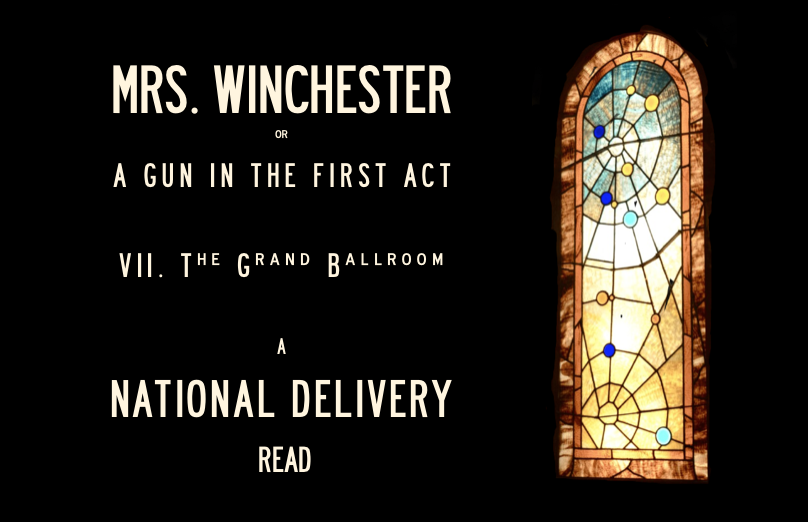Mrs. Winchester VII. The Grand Ballroom

If you deem a house with a ballroom extravagant, you will deem a house with two ballrooms flagrant.
This house indeed has two ballrooms, for one good reason: the far ballroom is for the living; this Grand Ballroom, is for the dead.
Regrettably neither has had much use. I have yet to throw a society ball, thus the far ballroom patiently awaits its first waltz.
This ballroom, on the other hand, has been occasionally festive.
Festive is not the word. Attended may be the word.
After this first ballroom was completed, I came one evening to inspect it, and witnessed something not meant for my eyes. I saw Gonzalo Gallegos in the middle of the ballroom, dancing with someone who was not there.
He was then seventy-three years old, and hunched over from years of outdoor work. Yet there was lightness in his step, and grace to his movement. He clasped one hand around delicate, invisible fingers, and placed the other in the small of an imagined back. He danced slowly, covering the entire floor of the ballroom, and if there were any music playing, it was music that he alone could hear.
I watched him dance with his missing partner for several moments, then left them alone.
A few weeks later, Mr. Gallegos died. After his funeral, I invited the church organist to the house. When Mrs. Bixby arrived on our agreed-to Saturday evening, I brought her to the ballroom, introduced her to the pipe organ that had been imported from Europe, and asked her to play some dance pieces. The ballroom was lit by candles, and I had squeezed into a gown I had not worn since it fit. I sat in a high-backed chair, and as the organist played, I envisioned Mr. Gallegos dancing - this time with a partner who was not missing. They waltzed. And as I watched them waltz, they were joined by my mother and father, who waltzed alongside them. The two couples were soon joined by Oliver and Jane, my father-and-mother in law. And then by William, who danced holding baby Annie. The tall windows were open onto the night. I sipped brandy, urged the organist to continue playing, and imagined the ballroom to be a place beyond heaven and hell where the dead, in their longing, might convene.
For several months, this became a Saturday evening routine. In time, there were dancers within the ballroom and dancers without: miners, missionaries, railroad workers, cowhands, pioneers, gatherers, sailors, and thespians. Many danced alone, and many bore the evidence of their demise, often enough an uneven shock of blood discoloring their garments. Some with parts of their body abbreviated. Yet still they danced, and still they held my fancy. Indeed, if the air outside was temperate, I would push open the doors of the main floor and bid them all inside.
At the end of one evening Mrs. Bixby thanked me for my generosity, then said she would come to the house no more, for she was spooked.
I did not see her again for two years. Then one Saturday evening, she came to the house in the company of her daughter, also an organist. Her daughter began playing the pieces I had come to know so well through her mother’s hands. And then, Mrs. Bixby herself took to the floor, and began dancing, alone, but not alone.
I would have joined her, but I am one of those unfortunate souls who hears the music but cannot dance.
NEXT: The Witch's Cap
From Mrs. Winchester, or, A Gun in the First Act by Joe Christiano